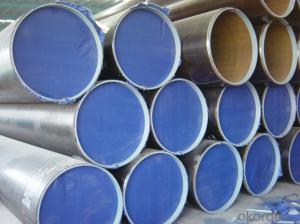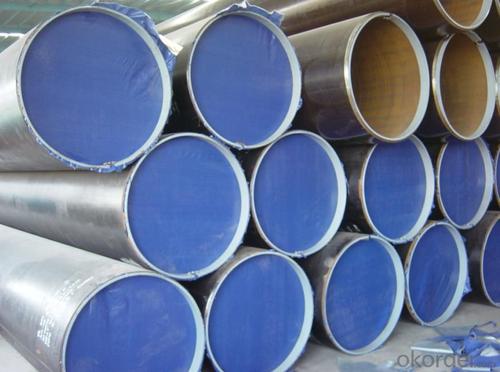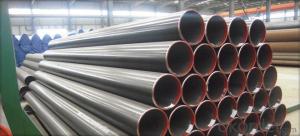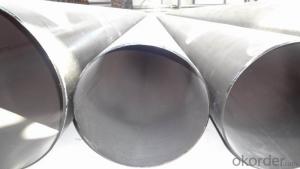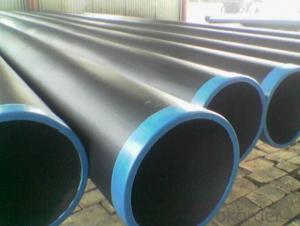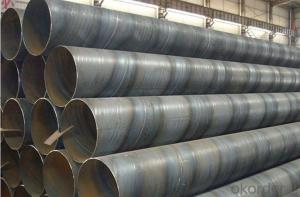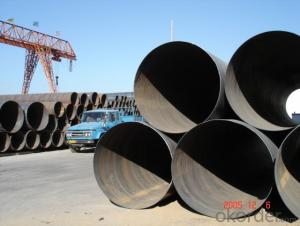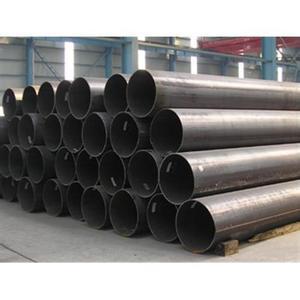X56 LSAW STEEL PIPE
- Loading Port:
- China Main Port
- Payment Terms:
- TT or LC
- Min Order Qty:
- -
- Supply Capability:
- -
OKorder Service Pledge
OKorder Financial Service
You Might Also Like
Product Description:
1、Structure of Welded Steel Tube:
Welded Steel Tube is formed by drawing a solid billet over a piercing rod to create the hollow shell. We are company that have many years experience and professional manager team and engineer team and sales team, sure we will provide you high quality of welded pipe and professioanl service.
2、Main Features of the Welded Steel Tube:
• High manufacturing accuracy
• The higher strength
• The small inertia resistance
• Strong heat dissipation ability
• Good visual effect
• Satisfy price
3、Welded Steel Tube Specification:
Standard | GB, DIN, ASTM ASTM A106-2006, ASTM A53-2007 |
Grade | 10#-45#, 16Mn 10#, 20#, 45#, 16Mn |
Thickness | 8 - 33 mm |
Section Shape | Round |
Outer Diameter | 133 - 219 mm |
Place of Origin | Shandong, China (Mainland) |
Secondary Or Not | Non-secondary |
Application | Hydraulic Pipe |
Technique | Cold Drawn |
Certification | API |
Surface Treatment | factory state or painted black |
Special Pipe | API Pipe |
Alloy Or Not | Non-alloy |
Length | 5-12M |
Outer Diameter | 21.3-610mm |
Grade | 20#, 45#, Q345, API J55, API K55, API L80, API N80, API P110, A53B |
Standard | ASME, ASTM |
1) Material:20#(ASTM A 106/A53 GRB.API5LGRB,GB),45#,16Mn,10#.
2) Specification range:OD:21.3-610mm,WT:6-70mm,length:6-12m or according to the requirement of clients.
3) Excutive standards:GB,ASME API5L.ASTM A 106/A53,Despite of the above standards,we can also supply seamless steel pipe with standard of DIN,JIS,and so on,and also develop new products according to the requirements of our clients!
4) Surface:black lacquered,varnish coating or galvanized.
5) Ends:Beveled or square cut,plastic capped,painted.
6) Packing:bundles wrapped with strong steel strip,seaworthy packing.
4、Packaging & Delivery
Packaging Details: | seaworthy package,bundles wrapped with strong steel strip |
Delivery Detail: | 15-30days after received 30%TT |
5、FAQ of Welded Steel Tube:
①How is the quality of your products?
We have many years business experience in this area, and we have professional engineer and manager team and sure we can provide you high quality production and professional service.
②How about price?
Yes, we are factory and be able to give you lowest price below market one and if you like bargain and factory price is not low enough as you think, just don’t waste your time.Please trust the quotation we would give you, it is professional one.
③Why should you chose us?
We can give you both.Additionally, we can also offer professional products inquiry, products knowledge train(for agents), smooth goods delivery, exellent customer solution proposals.Our service formula: good quality+good price+good service=customer’s trust
SGS test is available, customer inspection before shipping is welcome, third party inspection is no problem.
6、 Welded Steel Tube Images:
- Q: What does "steel pipe SC" mean?
- DN100 and "SCH80" refer to the outer diameter and the wall thickness of the steel pipe;
- Q: What is the maximum temperature that steel pipes can withstand?
- The maximum temperature that steel pipes can withstand depends on the grade and type of steel used. Generally, carbon steel pipes can withstand temperatures up to 1000°C (1832°F), while stainless steel pipes can handle temperatures up to 1200°C (2192°F). However, it is essential to consult the specific specifications and guidelines provided by the manufacturer for accurate temperature limits.
- Q: How are steel pipes transported and stored?
- Steel pipes are typically transported by loading them onto trucks or shipping containers, while larger pipes may be transported by rail or barge. During transportation, pipes are secured and protected from damage using straps, braces, or foam padding. Once at the storage site, pipes are usually stacked in a designated area, either vertically or horizontally, depending on their size and weight. They may also be stored in racks or on stands to prevent them from rolling or collapsing. Proper storage conditions include keeping the pipes away from moisture, extreme temperatures, and corrosive substances to maintain their quality.
- Q: Can steel pipes be used for underground gas distribution?
- Yes, steel pipes can be used for underground gas distribution. Steel pipes are commonly used for gas distribution as they are strong, durable, and can withstand high pressure. Additionally, steel pipes have excellent resistance to corrosion, which is crucial for underground installations. However, it is important to ensure proper coating and insulation to prevent any potential damage or leakage.
- Q: What are the different methods of joining steel pipes for steam applications?
- The different methods of joining steel pipes for steam applications include welding, threading, flanging, and grooving. Welding involves fusing the pipes together using heat, while threading involves screwing the pipes together using threaded fittings. Flanging involves connecting the pipes by creating a flared or flat surface at the end of each pipe and using bolts to secure them together. Grooving involves creating a groove on the end of each pipe and using a coupling to connect them.
- Q: What is the impact of temperature on steel pipes?
- The significance of temperature on steel pipes cannot be underestimated, as it can bring about both positive and negative consequences. When exposed to high temperatures, steel pipes undergo thermal expansion, which can result in distortion or buckling. This expansion also has the potential to affect joints and connections, leading to leaks or failures. Hence, it is imperative to take into consideration the coefficient of thermal expansion during the design and installation of steel pipes in environments with elevated temperatures. Conversely, steel pipes possess remarkable thermal conductivity, enabling them to endure high temperatures without substantial deterioration. This characteristic renders them suitable for applications where heat transfer is of utmost importance, such as in industrial processes or heating systems. Extreme cold temperatures also pose a threat to steel pipes. Freezing conditions cause water or other fluids within the pipes to expand, resulting in cracks or bursts. This can lead to leaks, fluid loss, and potential harm to surrounding structures. Consequently, it is necessary to implement appropriate insulation and preventive measures to ensure the integrity of steel pipes in cold environments. Moreover, temperature fluctuations can impact the mechanical properties of steel, including its tensile strength and toughness. Prolonged exposure to elevated temperatures can cause a phenomenon known as thermal degradation, which diminishes the steel's strength and renders it more susceptible to deformation or failure. In conclusion, temperature exerts a significant influence on steel pipes, affecting their structural integrity, thermal performance, and mechanical properties. Proper design, insulation, and maintenance are crucial to guarantee the safe and efficient operation of steel pipes under varying temperature conditions.
- Q: Can steel pipes be used for aboveground applications?
- Yes, steel pipes can be used for aboveground applications. Steel pipes are known for their strength, durability, and resistance to corrosion, which makes them suitable for various aboveground applications. They are commonly used in industries such as construction, oil and gas, water transportation, and infrastructure development. Steel pipes can be used for aboveground applications such as structural supports, handrails, fencing, scaffolding, outdoor pipelines, and various other outdoor structures. Additionally, steel pipes can be coated or painted to provide further protection against weather conditions and enhance their aesthetic appearance. Overall, steel pipes are a versatile choice for aboveground applications due to their reliability and long-lasting performance.
- Q: Can steel pipes be used for underground water treatment systems?
- Certainly, underground water treatment systems can utilize steel pipes. Renowned for their durability, strength, and resistance to corrosion, steel pipes prove themselves suitable for a range of uses, including underground water treatment systems. They possess the ability to endure the pressure and environmental circumstances found underground, guaranteeing the secure and effective conveyance of water within the treatment system. Nevertheless, it is crucial to take into account the water quality and the likelihood of corrosion in the particular location when opting for the type of steel and implementing safeguarding measures, such as coatings or cathodic protection, to avert corrosion and ensure the pipes' longevity.
- Q: What is the difference between seamless and welded steel pipes?
- The main difference between seamless and welded steel pipes lies in their manufacturing process. Seamless pipes are made by piercing a solid cylindrical steel billet to create a hollow tube without any welding or joints. On the other hand, welded pipes are formed by rolling a flat steel plate and then welding the edges together to create a cylindrical shape. This welding process introduces a seam along the length of the pipe. Consequently, seamless pipes are typically considered stronger, more reliable, and better suited for high-pressure applications, while welded pipes are more cost-effective and commonly used for less demanding applications.
- Q: How do you calculate the pipe thermal expansion coefficient for steel pipes?
- In order to calculate the pipe thermal expansion coefficient for steel pipes, it is necessary to take into account both the linear expansion coefficient of the material and the temperature change. The typical linear expansion coefficient for steel is approximately 12 x 10^-6 per degree Celsius. To begin with, establish the initial length of the pipe, which is represented by L0. Then, measure the temperature change, indicated as ΔT. Proceed by multiplying the initial length of the pipe by the linear expansion coefficient and the temperature change: ΔL = L0 * α * ΔT. The resulting value, ΔL, signifies the alteration in length of the steel pipe caused by thermal expansion.
Send your message to us
X56 LSAW STEEL PIPE
- Loading Port:
- China Main Port
- Payment Terms:
- TT or LC
- Min Order Qty:
- -
- Supply Capability:
- -
OKorder Service Pledge
OKorder Financial Service
Similar products
Hot products
Hot Searches
Related keywords
